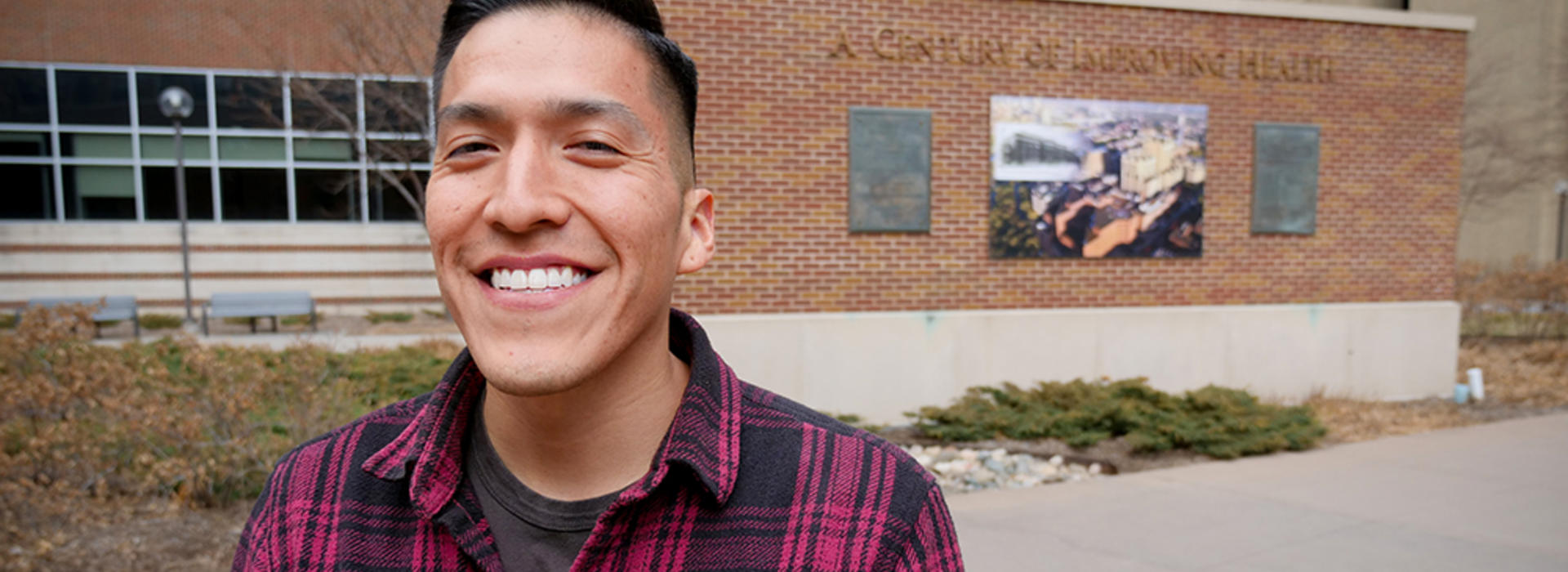
Celebrating Match Day: Casey Smith
Casey Smith traded off a lot when he chose the University of Minnesota Medical School. He left behind mountains for skyscrapers, desert for snow—and most difficult—family for education.
A member of the Navajo Nation, Smith—who is One Who Walks Around Clan (Honágháanii) born for Black Streaked Wood People Clan (Tsi’naajínii)—used his childhood dream of serving his reservation just outside of Gallup, New Mexico, as the motivation to make the move to Minnesota.
“Growing up, I really wanted to serve my community in some capacity. I had noticed family and friends challenged with managing their disease due to the rural setting because there were cultural or language barriers or there were perfectly healthy patients that didn’t have easy access to preventative resources,” Smith said. “Through these experiences, I decided that I wanted to serve as a healthcare provider and put effort toward improving the health of Indigenous communities.”
After finishing his undergraduate degree at the University of New Mexico, he started interviewing at medical schools. His interests in primary care and rural health led him more than 1,500 miles away from home to Duluth, Minnesota, where he began his medical education and a unique opportunity to work with Native American communities.
“Throughout my first and second year at the Duluth campus of the Medical School, I spent time on the White Earth Nation reservation for a week at a time,” he said. “I felt that was really special to be able to learn medicine but also to be able to work with communities that I am very much drawn to and passionate about.”
He works closely with Brenna Greenfield, PhD, LP, an assistant professor in the Department of Family Medicine and Biobehavioral Health in Duluth, on a research review that initiated a HotSpot study. The work, supported by the National Drug Early Warning System, is focused on identifying risk and protective factors for opioid overdose deaths among the White Earth Nation.
Smith’s proudest work, though, has been mentoring students underrepresented in medicine, spanning from local high school students to fellow medical students across the country.
“Native American representation in medicine is small, so I feel it is my imperative responsibility to be the person and mentor I needed when I was on the journey toward medical school,” he said.
Two years ago, Smith and a fellow medical student, Shelbie Shelder, started an Instagram account: @RezziesinMedicine.
“Instagram has had a very powerful impact. We’ve been able to connect with many Native students across the country, which has not only been inspiring to people in the community, but for me and Shelbie, it’s been inspiring and uplifting to us both,” he said. “Every time, I went home during breaks, I did presentations at the local high schools. I also mentored high school students in Duluth. It’s something that has helped me get through really challenging times in medical school.”
And, he plans to continue that mentorship—in California. Today, Smith matched at the University of California, San Francisco in primary care. It’s an opportunity that he says will prepare him as a clinician leader to approach challenges within underserved communities and to care for patients in ways unique to the Navajo culture.
“It’s very meaningful to patients and their care when they see someone who looks like them and who understands their background, their culture and the strengths and challenges of what it means to be a Native person,” he said. “I’m very excited to train alongside people who are like-minded and really have the same philosophy of medicine as me. They take into account the patient as a whole and make sure that social justice and diversity is very central to the program and the community. It’s really going to be about the people.”
Casey Smith is the son of Phillip Smith (Iyanbito, New Mexico) and Barbara Smith (Naschitti, New Mexico) and has a younger brother, Christopher.
To find out where all Medical School students matched, visit the 2020 Match Day page.